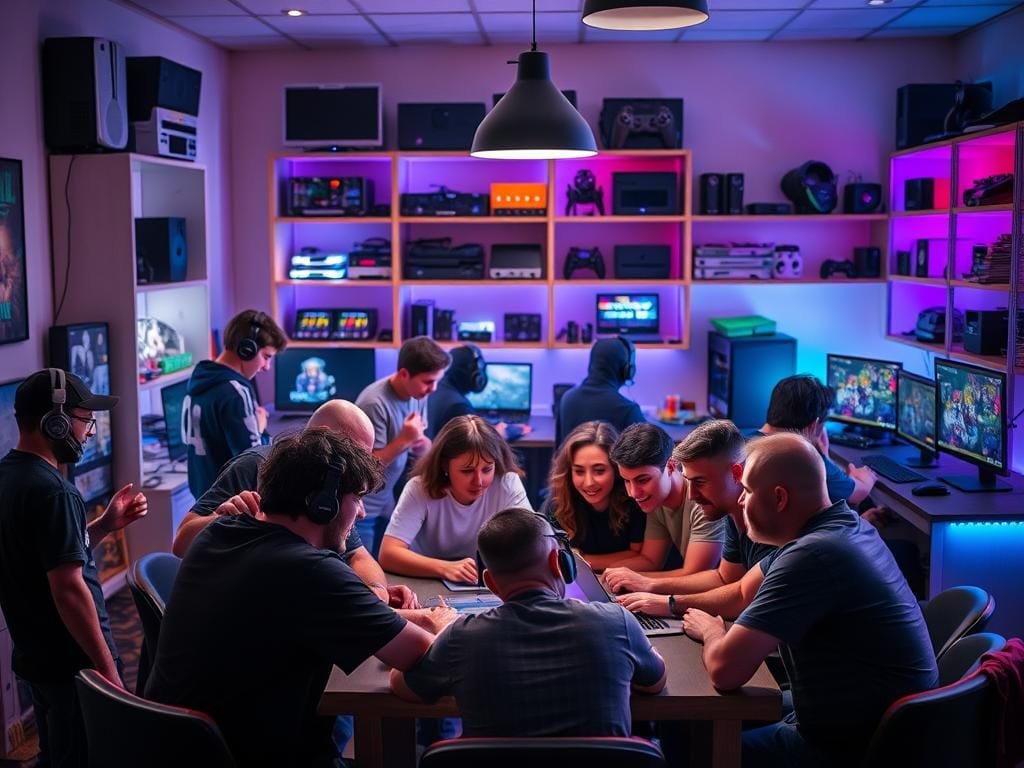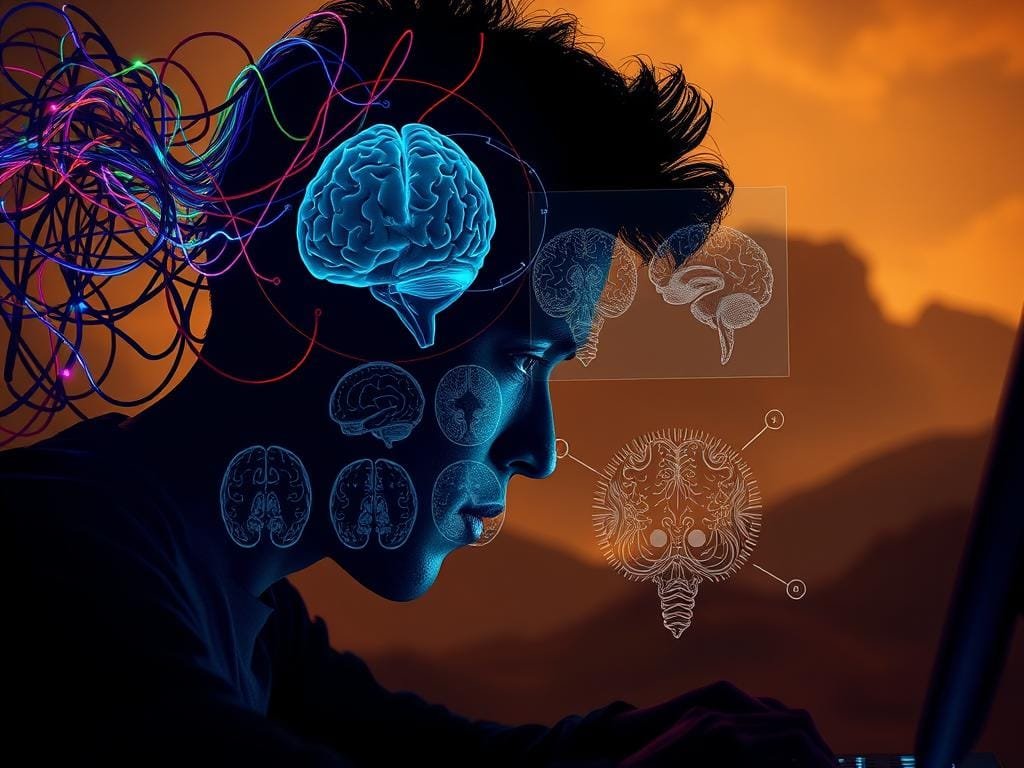The gaming world has grown into a multi-billion dollar market. Millions of people around the globe play different types of games. You might ask, what drives this huge interest? Why do people spend so much time playing games, and how does it change their brains?
Studies show that gaming can really change how we think, act, and feel. As you dive into the gaming world, you’ll find out why people play. You’ll also see how it impacts their minds.
Key Takeaways
- Gaming is a multi-billion dollar industry with a vast global audience.
- People play games for various reasons, including social interaction and cognitive challenge.
- Gaming can affect cognitive function, social behavior, and emotional well-being.
- The psychology of gaming is a complex and multifaceted field of study.
- Understanding gaming psychology can provide insights into human behavior.
Understanding the Basics of Gaming Psychology
Gaming psychology is a field that looks at why people play games. It combines psychology, sociology, and computer science. This helps us understand how games affect our minds and actions.
Gaming meets many human needs, like Maslow’s hierarchy of needs. For example, multiplayer games help players feel like they belong. They can interact, form communities, and work together towards goals.
Defining Gaming Psychology
Gaming psychology studies the psychological and social sides of gaming. It covers topics like gamer mentality and gaming addiction. It looks at how games are designed and how they affect players.
Researchers focus on game design, like rewards and stories. They want to know why some players get really into games. Sometimes, this can lead to compulsive behavior.
Key Concepts in Gaming Behavior
There are important ideas to grasp when looking at gaming behavior. These include:
- Motivation: What makes players start and keep playing games?
- Immersion: How much players get lost in the game.
- Social Interaction: The impact of multiplayer and online communities.
- Reward Systems: How game design, like points and leaderboards, affects players.
By studying these ideas, researchers can better understand gaming’s effects. They can see how games can be good or bad for us.
The Benefits of Playing Video Games
Playing video games offers many benefits, from better thinking skills to improved social connections and emotional health. It’s not just fun; it also positively impacts your life in many ways.
Cognitive Benefits
Video games can make you smarter. They require solving problems, thinking strategically, and making quick decisions. These skills improve your brain’s flexibility and speed.
Studies show gamers are better at focusing, spatial thinking, and handling multiple tasks. For example, a study in the American Psychological Association found gamers have better cognitive control and visual attention.
Games like puzzles or strategies challenge your brain. They help you think critically and solve complex problems.
Social Interaction and Community
Multiplayer games let you meet people with similar interests. You can join online communities, work with teammates, and talk about games. This helps you improve your communication skills and feel part of a community.
Gaming communities can lead to lasting friendships. They offer a chance to socialize and work together, enriching your life.
Emotional Well-being
Gaming can also boost your mood. It provides a break from stress and anxiety, giving you a chance to relax. Some games are made to calm you down, with peaceful settings and sounds.
Beating game challenges can make you feel proud and confident. This feeling can carry over into other parts of your life, improving your emotional health.
The Dark Side of Gaming
Gaming, like any other activity, has its downsides. It can lead to addiction and harm mental health. Knowing these risks helps you make smart choices about gaming.
Addiction and Compulsive Behavior
Gaming addiction is a big problem. Some people get too caught up in games. This can make them act compulsively, ignoring other parts of their life. Research shows it can hurt their mental and physical health a lot.
The psychological effects of gaming are real. Things like rewards and social pressure can make people addicted. Knowing this helps you stay safe in the gaming world.
Impact on Mental Health
Gaming’s effect on mental health is complex. Some games can help with stress and improve thinking. But too much gaming can lead to anxiety and depression.
It’s important to find a balance between gaming and other parts of life. Knowing the risks helps you control your gaming better.

Aggression and Violence
Gaming can also make people more aggressive and violent. Some studies link violent games to aggressive thoughts and actions. Knowing this helps you choose games wisely.
| Game Type | Potential Impact | Mitigation Strategies |
|---|---|---|
| Violent Video Games | Increased aggression and desensitization to violence | Limit exposure, choose alternative game genres |
| Multiplayer Games | Social interaction, potentially toxic communities | Use in-game tools to mute toxic players, join positive communities |
| Games with Reward Systems | Potential for addiction due to dopamine release | Set time limits, take regular breaks |
By knowing these risks and taking steps to avoid them, you can enjoy gaming safely. This protects your mental and emotional health.
The Role of Game Design in Engagement
Effective game design is key to keeping players interested. It uses psychology to keep the game exciting. Designers use many techniques to keep players hooked, making the game fun.
Reward systems are a big part of game design. Variable rewards are great because they build anticipation. Players keep playing because they don’t know what they’ll get next. This is why loot boxes and daily rewards are so popular.

Mechanics of Reward Systems
Reward systems use psychology to keep players engaged. They can be fixed or variable, or a mix of both. The surprise of getting a reward keeps players coming back for more.
- Fixed ratio rewards give clear rewards, motivating players.
- Variable ratio rewards keep players guessing, making it more exciting.
Influence of Storytelling and Narratives
Storytelling is also key in game design. A good story pulls players into the game world. Narrative-driven games use characters and plot twists to keep players interested.
Players can influence the story, making it feel more personal. This makes the game more engaging and memorable.
Importance of User Experience
User experience (UX) is critical in game design. It affects how players interact with the game. A good UX makes the game easy to use and fun.
A great UX design boosts player engagement. It reduces frustration and increases satisfaction. Players can enjoy the game without getting stuck.
Social Connections in Gaming
Gaming is more than just playing games. It’s about making friends and connections worldwide. Players from all over can meet and share experiences.
Gaming communities are lively and full of life. They form around games or genres, making everyone feel at home.
Building Communities Online
Online gaming communities are places for gamers to meet, share tips, and work together. They exist on forums, social media, and gaming sites.
The rise of online gaming communities has transformed the way we interact with games, turning them into social experiences that transcend geographical boundaries.
Let’s look at what these communities offer:
- Discussion forums for strategy and game-related topics
- Social media groups for community organization and events
- Dedicated platforms for live streaming and spectator sports
Positive Effects of Multiplayer Games
Multiplayer games help in many ways. They improve teamwork, communication, and problem-solving skills.
| Benefit | Description |
|---|---|
| Teamwork | Players work together to achieve common goals, promoting coordination and cooperation. |
| Communication | Effective communication is key in multiplayer games, helping players express themselves better. |
| Problem-solving | Players learn to think strategically and solve problems together through gameplay. |
Bridging Gaps Across Cultures
Gaming can bring people from different cultures together. It helps players understand and appreciate different backgrounds.

Through gaming, we can build a more open and accepting world. Players share their views and learn from each other, promoting global understanding.
The Impact of Age on Gaming Psychology
The effect of age on gaming psychology is complex. As people get older, their gaming habits change a lot. It’s important for game makers, psychologists, and teachers to know these changes. They help make games that are good for learning and fun.
Children and Learning Through Games
Video games can help kids learn important skills like solving problems and making decisions. Games for kids often help with memory, attention, and spatial skills. A study on PMC shows how games can improve kids’ minds.
Gaming also boosts creativity and teamwork. Multiplayer games help kids work together and communicate well. Educational games make learning fun, keeping kids interested and eager to learn.
“Video games can be a powerful tool for learning, combining fun and education to improve kids’ skills.
Adult Gaming Trends
Adults play games for many reasons, like to relax, socialize, and keep their minds sharp. Many enjoy puzzle, strategy, or role-playing games. Online gaming communities help adults make friends and feel part of a group.
Adults often look for games that challenge them, like strategy games or puzzles. These games can help keep their minds sharp, even as they get older.

| Age Group | Gaming Trends | Benefits |
|---|---|---|
| Children | Educational games, multiplayer games | Cognitive development, social skills |
| Adults | Strategy games, role-playing games | Stress relief, cognitive stimulation |
| Seniors | Casual games, puzzle games | Cognitive maintenance, social interaction |
Senior Gamers: Trends and Benefits
Senior gamers are often overlooked but can greatly benefit from gaming. They enjoy casual games like puzzles or card games. These games help keep their minds sharp and relaxed.
Gaming also helps seniors feel connected. Online platforms let them meet others, reducing loneliness. Games made for seniors are fun and keep their minds active.
In conclusion, gaming psychology changes with age, each group having its own trends and benefits. Understanding these differences helps us see how gaming can improve our minds and well-being.
The Neurobiology of Gaming
Gaming can change how your brain works, affecting things like how you feel rewards and control your actions. When you play games, different parts of your brain get active. Neurotransmitters are key to how you experience gaming.
Brain Regions Affected by Gaming
Gaming can change several brain areas, like those for emotions, rewards, and control. The prefrontal cortex helps with making decisions and controlling impulses. The amygdala deals with emotions. Studies suggest gamers might see changes in these areas.
Neurotransmitters and Gaming
Dopamine is very important in gaming, mainly for feeling rewards. Dopamine is linked to pleasure and motivation, which can make you want to keep playing. The dopamine system is key for learning and memory, and it’s deeply involved in video games’ effects,” says Dr. Daphne Bavelier, a top neuroscientist.
Long-term Effects on the Brain
Long-term gaming can change your brain’s function and structure. Research shows chronic gamers might have different brain sizes and connections than non-gamers. These changes can affect your thinking and emotions in various ways.
- Increased gray matter in areas related to attention and reward processing
- Enhanced neural connectivity between regions involved in cognitive control
- Potential negative impacts on emotional regulation and impulse control
Knowing how gaming affects the brain can help you choose better gaming habits. This way, you can enjoy the benefits while avoiding the downsides.
Future Trends in Gaming Psychology
The gaming world is on the verge of a big change. This is thanks to new tech in virtual reality and gamification. As tech gets better, we learn more about how games affect our minds. This lets us make games that are more fun and real.
Virtual Reality and Its Future
Virtual reality (VR) is changing games by making them feel real. A study found VR games can make players more engaged by up to 30%. You can learn more about why games are so addictive in our article on the psychology of gaming.
As VR gets better, games will feel even more real. For example, VR can help treat anxiety by letting people face fears safely. This makes therapy more effective.
Gamification in Education and Work
Gamification, using game elements in non-games, is growing in schools and workplaces. It uses things like rewards and challenges to make learning and work more fun. Dr. Jane Smith says it could change how we learn and work for the better.
For example, gamified learning platforms make school more fun by giving instant feedback. At work, it can improve training and teamwork. It makes the workplace more fun and productive.
Evolving Understanding of Gamer Behavior
We’re learning more about why people play games all the time. Studies show it’s about motivation, social interaction, and managing feelings. This helps game makers create games that fit what players want.
Knowing what motivates players helps game developers make better games. This makes players happier and more loyal. It’s good for the gaming industry as a whole.
Conclusion: The Complexity of Gaming Psychology
Gaming psychology is a complex field that looks at both good and bad sides of gaming. It’s important to understand it well. This helps us enjoy gaming more and avoid its downsides.
Key Takeaways
Exploring gaming psychology shows us how complex it is. It affects our minds and how we interact with others. But it can also lead to addiction and harm our mental health.
Promoting Healthy Gaming Habits
It’s vital to play games responsibly. Knowing the risks and how to avoid them helps. This way, gaming can be fun and good for you.
Gaming is always changing, and so is our understanding of its effects. By playing games responsibly and staying updated, we can handle the challenges of gaming psychology.
FAQ
What is gaming psychology, and why is it important?
Gaming psychology studies the mind and emotions when playing video games. It’s key to understanding why people play games, how games affect mental health, and the good and bad sides of gaming.
How do games satisfy human needs and motivations?
Games meet many human needs like social interaction, competition, and a break from reality. They can make us feel accomplished, boost our self-esteem, and let us express ourselves.
What are the cognitive benefits of playing video games?
Video games can sharpen skills like problem-solving, decision-making, and handling multiple tasks. Strategy and puzzle games also boost spatial awareness, memory, and focus.
Can gaming lead to addiction, and what are the signs?
Yes, gaming can be addictive. Signs include spending too much time gaming, ignoring important tasks, and gaming despite harm. Addiction can harm mental and physical health.
How do game designers use psychology to keep players engaged?
Designers use tricks like rewards, stories, and design to keep players hooked. These methods make players feel good, encouraging them to keep playing.
Can gaming have a positive impact on mental health?
Yes, gaming can be good for mental health. It can distract from stress, relax, and even help with anxiety and depression in some games.
How does age affect gaming psychology?
Age changes how people play games and why. Kids play for learning and fun, while adults use games to unwind and relieve stress.
What are the potentially long-term effects of gaming on the brain?
Too much gaming might change the brain, affecting reward, impulse, and emotions. But, more study is needed to know the full impact.
What is the role of virtual reality in the future of gaming psychology?
Virtual reality will be big in gaming psychology. It offers immersive experiences that could deepen the game’s psychological effects.
How can gamification be applied in non-gaming contexts?
Gamification uses game elements in areas like school, work, and health. It makes these places more engaging, motivating, and effective.
